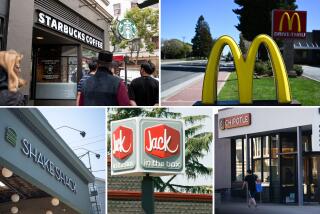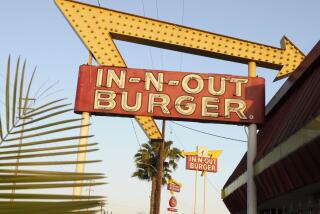Diaper masks, close quarters: Fast-food restaurants have struggled to protect workers from COVID-19
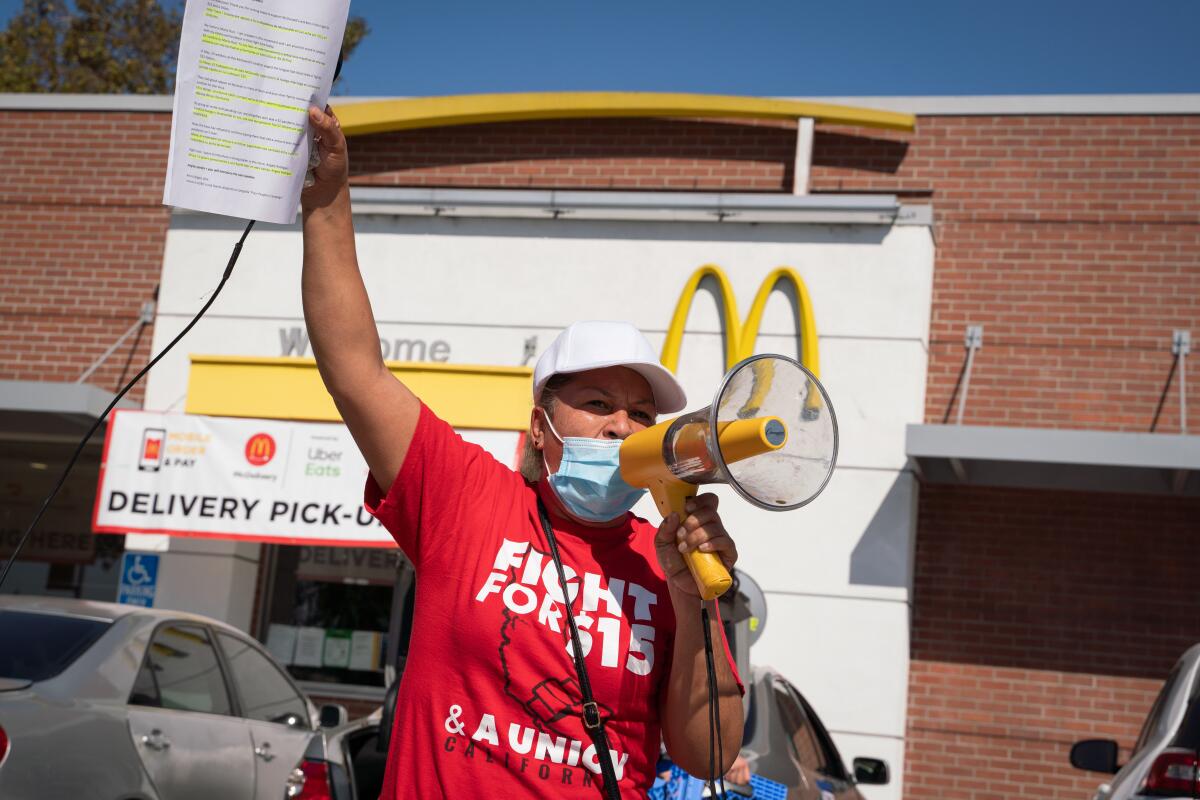
In the crowded kitchen of a McDonald’s outlet on a working-class commercial stretch of Oakland, it was as though the coronavirus didn’t exist.
Social distancing wasn’t enforced in the early weeks of the pandemic, workers at the Telegraph Avenue store claimed: As they boxed Big Macs, scooped French fries and bagged orders, they often stood shoulder to shoulder.
For the record:
2:55 p.m. Jan. 21, 2021This article stated that “Aguántante” is a Spanish word for “put up with it.” The correct spelling is “Aguántate.”
There weren’t enough masks, so managers told workers to improvise, offering up a box of dog diapers somebody had left at the store. Often, the outlet was so busy that workers said they had no time to wash their hands, let alone disinfect the countertops.
The outlet’s coronavirus information poster was of little help: It was printed in English, and most of the roughly 40 workers spoke Spanish.
When the coronavirus surged through the store in May, employees — even those with symptoms — said they were pressured to keep working, according to formal complaints filed with the local health department and the state Division of Occupational Safety and Health.
Cashier Yamile Osoy, 26, developed such severe COVID-19 symptoms that she told her shift manager that she felt sick and wanted to go home. According to her complaint, he ordered her to lower her mask so she could breathe easier — and finish her shift.
By summer, the coronavirus had flared at nine other McDonald’s outlets within 15 miles of the Telegraph Avenue store, with more than 70 workers and their families testing positive or exhibiting symptoms, the formal complaints show. Many of those employees worked at more than one outlet, potentially spreading the infection.
It’s a pattern that has repeated itself across the country as fast-food restaurants have struggled to maintain the health and safety of front-line workers who face conditions that frequently put themselves and their families at risk of contracting COVID-19.
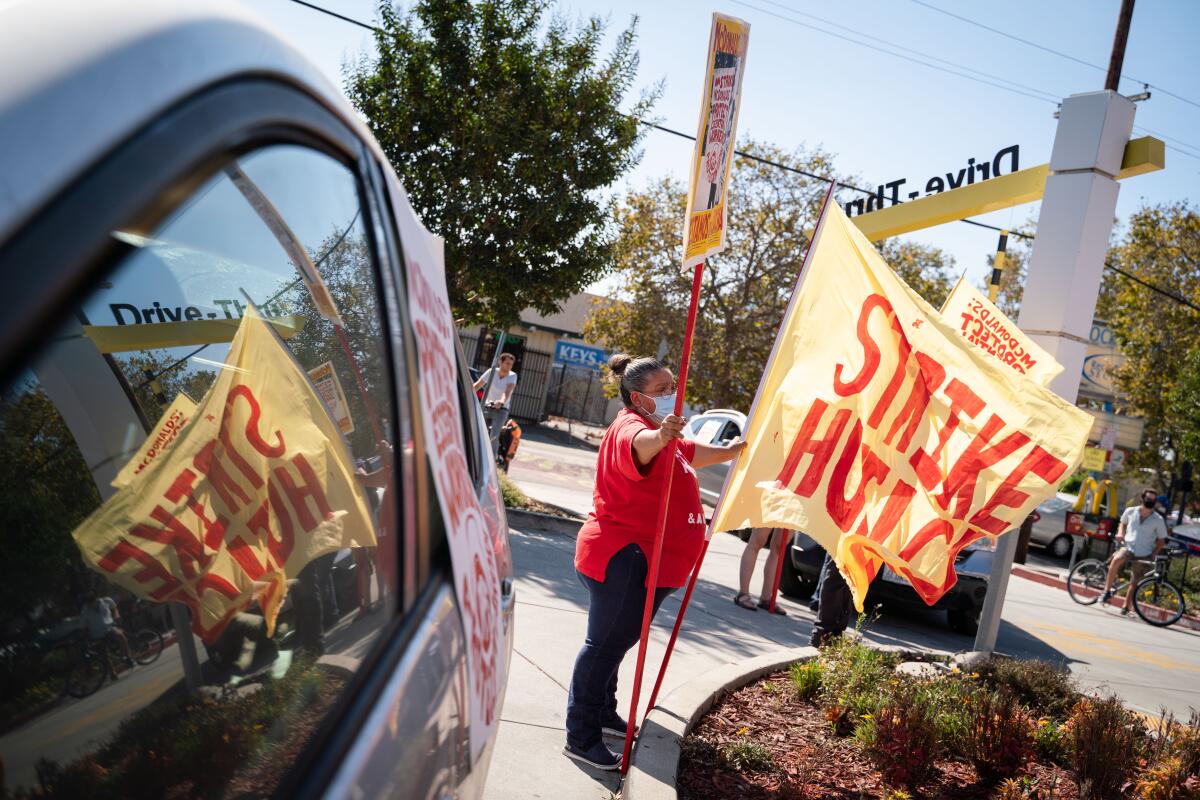
A lack of protective equipment and social distancing and pressure to work at all costs have persisted deep into the pandemic, according to a review of summaries of 1,600 complaints to the Occupational Safety and Health Administration concerning the coronavirus in the nation’s fast-food industry, along with 200 additional accounts found in health department records, lawsuits and news reports.
The documents offer an equally troubling record of regulators who have been slow to intervene.
So far, only three fast-food outlets in the U.S. have been cited for an OSHA violation in connection with a coronavirus-related complaint: a pie shop in Washington state, an Arby’s in Oregon and a waffle house in Minnesota. OSHA has levied only one fine, against the pie shop for $2,700, records show.
On-site investigations have been rare. In response to those 1,600 COVID complaints over the course of the pandemic, inspectors have visited only 56 fast-food outlets, according to OSHA records.
Nearly 600 cases remain open. But authorities closed about 1,000 cases without an inspection, the OSHA records show. Instead of visiting stores and interviewing workers, inspectors sent letters to owners. Some OSHA inspectors invited store managers to investigate complaints themselves and report back, the records show.
“OSHA investigates every complaint, whether it is received as a formal or informal complaint, or whistleblower complaint,” a Department of Labor spokesman wrote in an email. He did not comment on the low number of citations.
Local health officials, who have authority to enforce COVID-19 safety measures, have often failed to pick up the slack. A county health inspector responsible for the Telegraph Avenue McDonald’s was assigned to monitor health and safety compliance at “nearly 300 other facilities,” including several with COVID outbreaks, she wrote in an email to the outlet’s owner. And when she finally made an inspection, she went to the kitchen and began checking the temperature of the meat — a routine food-safety procedure.
The inspector did not talk to workers, said attorney B.J. Chisholm, who represents employees in a lawsuit against the outlet’s owner. In the July report, the inspector wrote: “All covid requirements are in place.”
The report came after a judge ordered the owner to upgrade safety measures in order to reopen.
Spokeswoman Neetu Balram wrote that the Alameda County health department “does its best to distribute work evenly among all staff, which has increased due to impacts of the pandemic.”
Michael Smith, who operates the Telegraph Avenue store, did not respond to specific accusations. In a written statement, Smith said that he had gone to great lengths to keep his workers safe during the pandemic, spending thousands of dollars to purchase protective gear and imposing “rigorous” safety procedures. “Our people are the heart and soul of my organization,” he wrote.
Citing complaints by workers, a bill was introduced Thursday in the California State Assembly that aims to improve safety standards for fast-food employees amid COVID-19.
“A disempowered work force faces a crisis in an industry with a poor history of compliance with workplace health and safety regulations,” the legislation reads.
Assemblywoman Lorena Gonzalez (D-San-Diego), who introduced the legislation, said she hopes the measure will boost the state’s enforcement of health and workplace protection laws and give workers a voice over workplace safety issues.
In March, Chipotle outlets in New York City were roiled by four worker strikes over coronavirus concerns. In June, 10 employees of a Chick-fil-A near Kansas City fell ill with COVID-19. In July, an employee of a Santa Monica Burger King died after working for a week while sick with a cough and other COVID-19 symptoms, according to a complaint, sparking a walkout.
It’s unclear whether McDonald’s has had more outbreaks at its locations or done a poorer job than other fast-food businesses at protecting its workers. However, McDonald’s USA has accumulated far more complaints than any other chain — more than 150 compared with Subway, the next on the list, with 40 — in keeping with its dominant share of the industry.
The nation’s largest fast-food restaurant chain, with 14,000 stores, is a staple for millions of families for a quick meal and is emblematic of the challenges the industry faces.
It has claimed it’s an industry leader when it comes to COVID-19 precautions, imposing more than 50 enhanced safety procedures to guard against the virus in its restaurants and engaging the Mayo Clinic for advice on how to “further enhance hygiene and cleanliness practices in support of customer and crew safety.”
Complaints filed by McDonald’s employees in 37 states, however, portray some of the chain’s outlets, both franchises and corporate-owned, as COVID-19 incubators: at their worst, crowded workplaces with inadequate protective gear and safety procedures.
Even when cases of COVID-19 appeared among staff, outlets remained open for business, according to the complaints, which were filed with state and federal regulators from March through Dec. 13.
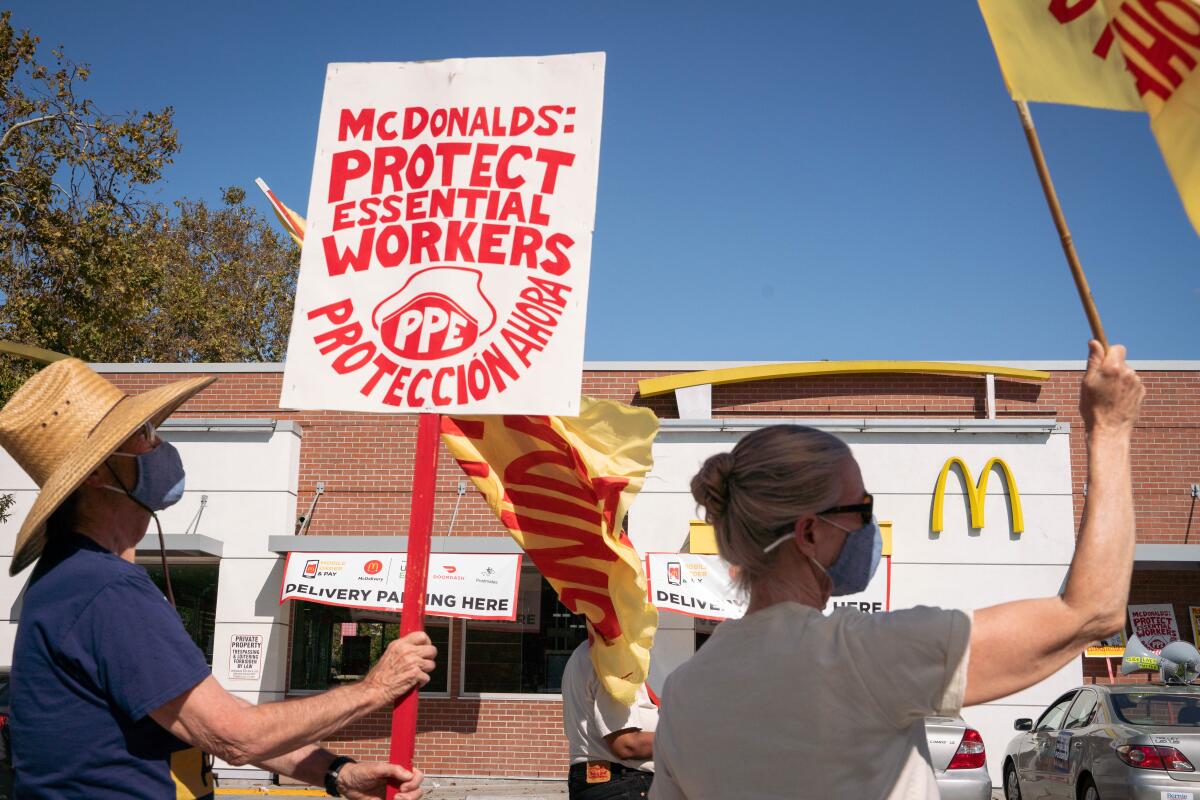
Restaurant cleaning was haphazard after cases were detected, and masks and gloves were in short supply, according to complaints. Sick pay and quarantine pay were not available in some stores, and given grudgingly in others, workers claimed.
As staffing levels fell in stores where COVID-19 had taken hold, employees filed complaints saying they were pressured to work double shifts or cover shifts at other outlets experiencing outbreaks.
In U.S. cities, McDonald’s employees typically earn about $15 an hour, according to the Service Employees International Union, which is seeking to unionize the fast-food industry. Many of those who filed complaints said they felt compelled to work even when sick, or risk having their hours cut or losing their jobs entirely.
Wrote Walter Cortez, a worker at another McDonald’s in the Bay Area: “The managers say, ‘Aguántante’” — put up with it — “because there is no one to cover your shift.”
McDonald’s executives maintain that the vast majority of its outlets are clean and safe.
Bill Garrett, who heads the company’s coronavirus task force, said he knew of only “a few isolated instances” in which the virus had been an issue at McDonald’s franchises.
“What I can tell you is we’re watching things very, very closely and we’re not seeing any type of large or widespread problem that we would react to,” he said.
Altogether, more than 230 McDonald’s outlets from Maine to Hawaii have been the subject of state or federal coronavirus complaints and health department reports. The virus has flared in about 140 of these outlets, and at least 500 workers and family members have fallen ill with COVID-19, according to the complaints and health reports. Dozens of franchise owners have self-reported additional cases among their employees.
That’s a tiny percentage of U.S. McDonald’s outlets. But the number of COVID-19 cases at McDonald’s is probably far higher than available information shows. Only three state health departments — Colorado, New Mexico and Oregon — publish data identifying businesses where workers have been infected with the coronavirus. All three recorded McDonald’s outbreaks, including one in eastern Oregon in which 40 people associated with two McDonald’s outlets near Hermiston became infected in July.
Blake Casper, owner of 63 McDonald’s franchises in Florida, said in an interview that about 100 of his 3,500 workers had become ill with COVID-19 so far, cases that do not appear in OSHA complaints or public state health department data. Casper, who is also chairman of the National Owners Assn., a franchisees group, contended that only one of those workers had gotten ill at work, citing contact tracing by his human resources department.
Franchisees like Casper run almost all the nation’s outlets. These independent owners pay rent and a cut of sales to McDonald’s USA, but set workers’ pay and benefits themselves. Casper said they have borne most of the financial cost of responding to the pandemic.
“We all got surprised — shocked — when this thing came barreling down in early March,” Casper said. Franchisees “scrambled” to buy protective gear and establish safety procedures, he said. They received guidance from corporate headquarters, he said, but little in the way of financial assistance, beyond McDonald’s using its massive buying power to secure special prices on protective gear.
SEIU officials said McDonald’s workforce has been deeply worried about contracting COVID-19 on the job. In a union survey from April, more than 90% of respondents said they had trouble getting masks, and one in five reported working while ill, either because they lacked paid sick leave or were afraid of being penalized for not showing up. The union also points to strikes over COVID safety that have shut down more than 100 McDonald’s outlets in 20 cities, including Los Angeles, Chicago and Oakland. The company has dismissed the strikes as publicity stunts.
As the pandemic unfolded, McDonald’s USA ordered franchisees to comply with a long list of safety measures: They were required to enforce social distancing, provide adequate protective gear and ensure that cleaning procedures were followed, said Garrett, the executive in charge.
McDonald’s USA also pushed franchisees to offer paid sick leave to workers during the pandemic. But franchisees pushed back, saying they were “losing faith” in management because the company wasn’t providing the financial relief they needed.
McDonald’s USA backed away from the sick-pay issue. But David Tovar, a company spokesman, said he is confident that McDonald’s workers can get paid sick leave during the crisis — either from franchisees or through provisions of the federal Families First Coronavirus Response Act and state and local laws.
Meanwhile, the company says it has aided its franchisees by deferring hundreds of millions of dollars in rent and royalty payments and by pumping $100 million into marketing.
Many franchisees also have gotten help from federal Paycheck Protection Program loans, a feature of the CARES Act.
Operators of at least 70 McDonald’s outlets facing coronavirus complaints got the loans, collectively borrowing at least $50 million, according to Small Business Administration data. Among them was the corporation that owns the Telegraph Avenue store in Oakland, which borrowed at least $1 million in potentially forgivable loans. The money is intended to help businesses pay their workers.
More than 100 complaints, spread across nearly 60 towns and cities, accused McDonald’s of botching its response to a known COVID-19 case, either by failing to shut down for a proper cleaning or by neglecting to get exposed workers into quarantine. Some of the complaints date back to the chaotic early weeks of the pandemic, but many others date from late summer or fall, after stores had time to solidify safety protocols.
Often, workers complained that they weren’t informed when COVID-19 hit their workplace. An employee at a Chicago outlet said she learned from a Facebook post that a co-worker had tested positive. Managers kept things under wraps to avoid ordering quarantines, complainants claimed.
In dozens of other complaints, as recently as November, McDonald’s staff said they found themselves working alongside employees with obvious flu-like symptoms, records show. As a worker in Jasper, Tenn., complained in July, “Several employees are sick with fevers and are being told to continue to work.”
Some employees reported that paid sick leave was discouraged or unavailable, so they worked even when they knew they shouldn’t.
“Three people in my house tested positive,” Rosa Contreras, a worker in Ontario, Calif., who lived with other McDonald’s employees, wrote in May. “But still I went to work one more day because I needed the money.” She said she later tested positive herself.
Some workers said they were required to enforce COVID safety rules, forcing them into conflict with customers.
In May, an irate customer in Oklahoma City shot and wounded three workers after being told an outlet’s dining area was closed because of the pandemic. In June, in Oakland, a 19-year-old cashier described being punched and slapped by a customer after she told him to wear a mask. In July, a Chicago customer who was admonished to wear a mask attacked a worker, slapping her and pulling her hair as bystanders videotaped the altercation.
As employees were circulated among outlets, the virus appeared to follow them — an allegation made in complaints from across the country.
After the May outbreak at Oakland’s Telegraph Avenue outlet, coronavirus cases were reported at a McDonald’s outlet three miles away in Berkeley, near the University of California campus.
By the end of June, more than 20 Berkeley workers and family members were ill with COVID-19 and soon other outlets in Oakland and Hayward had recorded infections, according to complaints.
Similar multi-store outbreaks occurred at McDonald’s outlets in Los Angeles and on Hawaii’s Big Island.
In May, workers backed by SEIU sued McDonald’s in Chicago, claiming the risk of COVID-19 was so great that four outlets in the city should be declared public nuisances. The lawsuit accused operators of violating a state safety order by failing to enforce mask wearing and social distancing, and by not informing workers about COVID-19 outbreaks in the workplace.
In June, Circuit Court Judge Eve Reilly found that at three stores, company policies “are failing to be properly implemented.” She ordered McDonald’s of Illinois and a franchisee to impose social distancing and enforce the wearing of masks.
Emboldened by union organizers, 20 workers at the Telegraph Avenue McDonald’s in Oakland walked off the job in May, forcing the store to shut down. The workers sued and an Oakland judge imposed strict conditions for the outlet to reopen.
It reopened on July 15 for drive-through only.
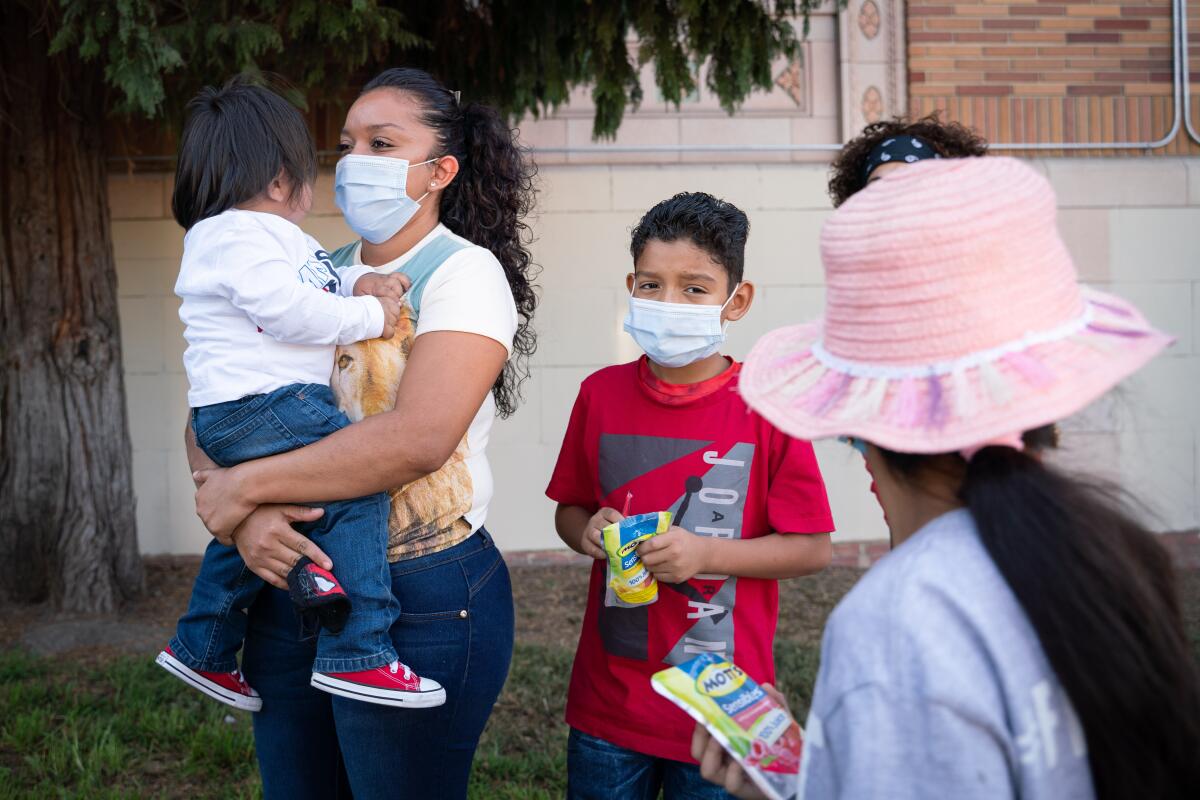
After developing COVID-19 symptoms and nearly fainting at work, Yamile Osoy went home to the single room in an Oakland apartment that she shares with her two boys. There she nursed the children through the infection even as she was battling it herself.
“I felt bad,” she said. “But who was going to take care of my kids if I didn’t?”
She hasn’t worked since May. Her partner has helped with the rent, and she has depended on food banks for groceries.
She hopes to go back to work at McDonald’s as soon her old $14.14-an-hour job on the night shift opens up. She really needs the money, she said.
More to Read
Sign up for Essential California
The most important California stories and recommendations in your inbox every morning.
You may occasionally receive promotional content from the Los Angeles Times.

